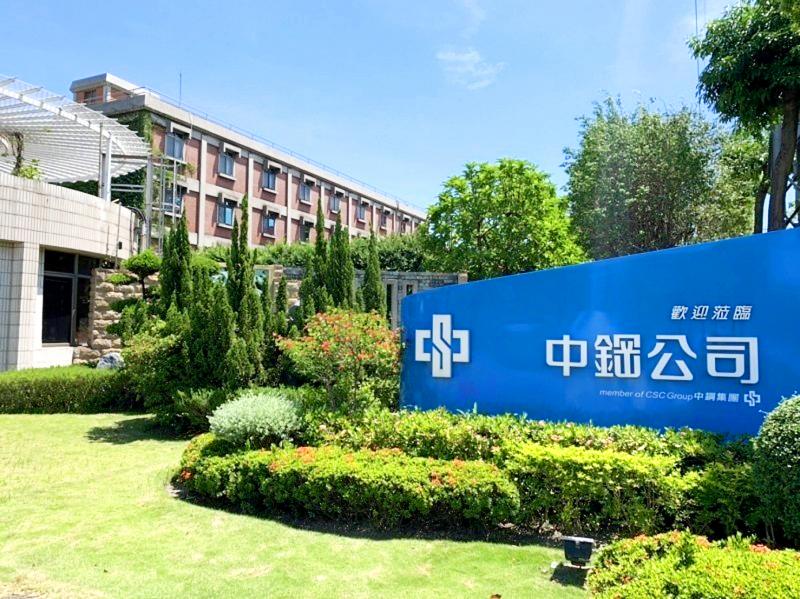China Steel Corp (CSC, 中鋼) yesterday said it would raise prices for domestic deliveries by 1.32 percent next month and for next quarter to reflect higher manufacturing costs and rising steel demand.
Strong global economic recovery, a bullish prediction of Taiwan’s GDP growth of 5.4 to 6 percent, and large infrastructure projects in the US, China, Europe and India have set the tone for a strong steel market for the coming seasons, but there is still uncertainty due to the COVID-19 pandemic and logistics issues, the nation’s largest steelmaker said.
“We are heading into the fourth quarter, traditionally the strong quarter for steel demand,” the company said in a statement. “We expect demand to keep surging, but global logistic logjams and the resurgence of COVID-19 in Southeast Asia could affect some downstream demand.”

Photo courtesy of China Steel Corp
If there is a disruption in downstream demand, the steelmaker would stagger the release of steel, it said.
“The strength of Taiwanese manufacturing is not in doubt,” it added.
Next month, electro-plated steel roll prices would increase by NT$500 per tonne, the firm said.
For the fourth quarter, prices of high-carbon rods would also rise by NT$500 per tonne, it said.
Prices of steel plates, hot-rolled steel, hot-rolled steel rolls, electroplated steel rolls and automotive steel would increase by NT$1,500 per tonne, while rod material prices would rise by NT$1,000 per tonne, it said.
Due to the implementation of decarbonization policies in some countries around the world and the strict restrictions on crude steel production in China ahead of next year’s Beijing Winter Olympics, the demand for steel is expected to remain tight, the firm said.
Steel mills undergoing repairs also affects supply, it said.
“Starting from September, plants in Europe, the US and Asia entered their annual maintenance period, including almost half of all blast furnaces in China’s steelmaking hub of Tangshan,” the company said.
US steel prices keep breaking records, with hot-rolled steel priced at US$2,100 per tonne and cold-rolled steel nearing US$2,400 per tonne, it said.
Moreover, Japan’s Nippon Steel Corp has reached a long-awaited deal with Toyota Motors Co to raise the price of steel by US$182 per tonne, the biggest price increase in 10 years, CSC said.
The agreement would have a knock-on effect on prices for home appliances, construction and shipbuilding, it added.
Although iron ore prices fell slightly, coking coal prices rose to US$350 per tonne, a 10-year high, it said.
Prices of other steelmaking materials such as electrolytic manganese are also spiking, it said.
“The overall cost of raw materials remains high, which will support international steel prices,” the company said.
As global carbon neutrality efforts take shape, most industrialized countries are putting plans for carbon taxes or the trading of carbon credits, it said.
“The era of expensive steel is upon us,” the company said.

Three experts in the high technology industry have said that US President Donald Trump’s pledge to impose higher tariffs on Taiwanese semiconductors is part of an effort to force Taiwan Semiconductor Manufacturing Co (TSMC, 台積電) to the negotiating table. In a speech to Republicans on Jan. 27, Trump said he intends to impose tariffs on Taiwan to bring chip production to the US. “The incentive is going to be they’re not going to want to pay a 25, 50 or even a 100 percent tax,” he said. Darson Chiu (邱達生), an economics professor at Taichung-based Tunghai University and director-general of

‘LEGACY CHIPS’: Chinese companies have dramatically increased mature chip production capacity, but the West’s drive for secure supply chains offers a lifeline for Taiwan When Powerchip Technology Corp (力晶科技) entered a deal with the eastern Chinese city of Hefei in 2015 to set up a new chip foundry, it hoped the move would help provide better access to the promising Chinese market. However, nine years later, that Chinese foundry, Nexchip Semiconductor Corp (合晶集成), has become one of its biggest rivals in the legacy chip space, leveraging steep discounts after Beijing’s localization call forced Powerchip to give up the once-lucrative business making integrated circuits for Chinese flat panels. Nexchip is among Chinese foundries quickly winning market share in the crucial US$56.3 billion industry of so-called legacy

Taiwan Semiconductor Manufacturing Co (TSMC, 台積電) yesterday held its first board of directors meeting in the US, at which it did not unveil any new US investments despite mounting tariff threats from US President Donald Trump. Trump has threatened to impose 100 percent tariffs on Taiwan-made chips, prompting market speculation that TSMC might consider boosting its chip capacity in the US or ramping up production of advanced chips such as those using a 2-nanometer technology process at its Arizona fabs ahead of schedule. Speculation also swirled that the chipmaker might consider building its own advanced packaging capacity in the US as part

A move by US President Donald Trump to slap a 25 percent tariff on all steel imports is expected to place Taiwan-made steel, which already has a 25 percent tariff, on an equal footing, the Taiwan Steel & Iron Industries Association said yesterday. Speaking with CNA, association chairman Hwang Chien-chih (黃建智) said such an equal footing is expected to boost Taiwan’s competitive edge against other countries in the US market, describing the tariffs as "positive" for Taiwanese steel exporters. On Monday, Trump signed two executive orders imposing the new metal tariffs on imported steel and aluminum with no exceptions and exemptions, effective